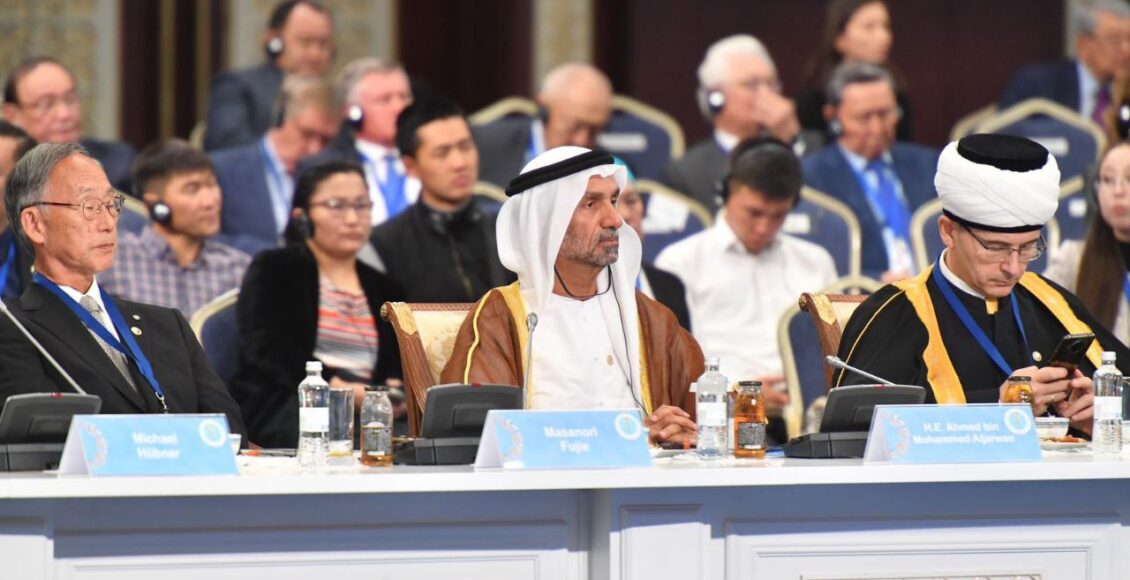Al-Jarwan heads the delegation of the Global Council for Tolerance and Peace to the Conference of Leaders of World and Traditional Religions in Kazakhstan
His Excellency Ahmed bin Muhammad Al-Jarwan, President of the Global Council for Tolerance and Peace, headed the delegation of the Global Council for Tolerance and Peace to the Conference of Leaders of World and Traditional Religions in the city of Nur-Sultan, the capital of Kazakhstan, which is being held this year under the title “The Role of Leaders of World and Traditional Religions in the Spiritual and Social Development of Humanity in a Period.” after the pandemic,” in the presence of His Excellency President Kassym-Jomart Tokayev, President of the Republic of Kazakhstan, Pope Francis, the Grand Imam, Sheikh Dr. Ahmed Al-Tayeb, Sheikh of Al-Azhar, and a very large number of religious leaders around the world.

His Excellency Ahmed bin Mohammed Al-Jarwan, President of the Global Council for Tolerance and Peace, delivered a speech before the conference. In his speech, he praised the important role played by Kazakhstan in the field of consolidating world peace and dialogue among civilizations and for hosting the Conference of Religious Leaders, which is one of the most important religious meetings in the world, which confirms the keenness to sustain the work aimed at strengthening the role of the clergy in addressing the issues of our societies.
Al-Jarwan said: “The role assigned to religious leaders in the development of our societies has its own nature and characteristics that make it the most influential in human behavior. If the development of our societies is achieved through the modernity and development of the visions of politicians, economists and other scholars specialized in various fields, which are considered important tools for development, The modernity and development of the clergy’s visions and their analyzes of the issues of our societies and ways of dealing with the developments that appear daily in our lives are the most dangerous and most important in achieving the goals of development.”
“We have witnessed during the recent period a lot of cultural and religious issues that have been raised and have begun to study and analyze them from religious points of view in our local communities. They are the most important issues that I believe that the position of religious leaders in dealing with will reflect our ability to manage the dialogue of civilizations in the way we seek. Those issues The dispute represents the food and drink that extremist groups in all religions feed on in order to sow discord, division, racism and sectarianism,” he added.
Al-Jarwan said that the extremist terrorist organizations facing our societies are like insidious diseases that affect the human body, making the cells of the body attack the body itself until it is eliminated, which is what these terrorist organizations do when they infect young people and make them attack their societies. Unfortunately, the cell of the body that is infected with these malignant diseases is difficult to heal, but the cure for these diseases is to restore the body’s immunity and to restore the body to produce good cells that can confront the disease and eliminate it. If you want to measure the immunity of societies and their ability to combat the scourge of extremism, you have to measure the extent to which the values of tolerance are spread among their children. The more they are imbued with the values of tolerance, the more they guarantee the integrity of their societies, the cohesion of their fabric, and their ability to combat any form of extremism.
Al-Jarwan concluded: “This is our vision and mission in the Global Council for Tolerance and Peace to combat the scourge of extremism, and we seek in the Council to spread the values of tolerance through cooperation with various partners from countries, international organizations or civil society organizations. We pay special attention to religious, educational and research institutions, And we seek to have tolerance curricula in schools to educate our children on its values and principles, which we called the Peace Planting Program. The Council also prepared a master’s program in Tolerance and Peace to guide researchers towards studying issues that lead to a decline in the values of tolerance in societies, and to propose recommendations that help us strengthen efforts to disseminate tolerance according to scientific foundations.


